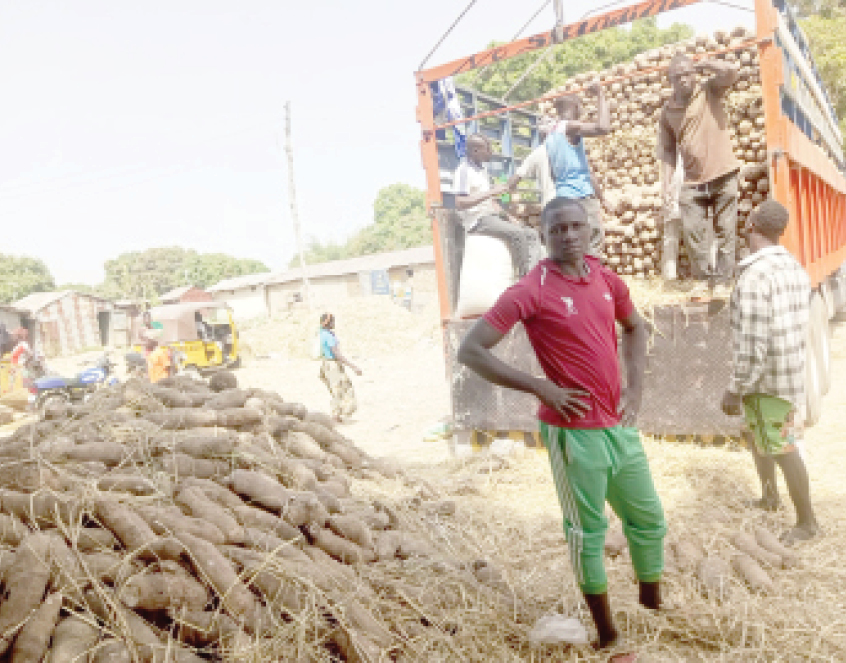Incessant kidnapping of farmers in Niger State has forced many to keep away from farming. Experts believe the situation could worsen the already declining agricultural productivity in the state, which is one of the major producers of grains in the country.
The investigation by Daily Trust on Sunday revealed that close to a decade, banditry has stopped many farming communities in Paikoro, Rafi, Munya, Shiroro, Borgu, Mariga, Rijau, Mashegu, Kontagora and Wushishi local government areas from accessing their farms.
The affected local government areas – Paikoro, Munya, Shiroro and Rafi local government areas—produce yam in commercial quantities. There is an international yam market in Paiko, where the produce is exported to neighbouring countries like Niger Republic, Chad, among others.
Other affected local government areas like Mashegu, Magama, Rijau, Kontagora and Borgu produce beans, guinea corn, millet and other crops in commercial quantities.
Daily Trust on Sunday gathered that while some displaced persons in Gwada, Shiroro Local Government Area and others, especially women, engage in menial jobs to assist their men provide for their children, some others choose prostitution to make ends meet.
A figure from the Niger State Emergency Management Agency (NSEMA) revealed that there are currently 1,424 displaced persons at the Gwada camp, Shiroro Local Government Area, out of which 580 are of school age but have been denied access to any form of education in the last five years.
Some displaced persons at the camp told Daily Trust on Sunday that 16 of their children died in recent times due to poor health conditions and malnutrition.
One of the displaced persons at Gwada, Idris Mohammed said, “We have spent three to four years in this camp without doing anything. We don’t have food and there is no medical attention. We also don’t have money. All our children are out of school.”
Another displaced person, Hajara Aliyu also said, “We are not happy here. We don’t have food and water. We suffer from different diseases because we don’t have medical doctors to attend to us; and we don’t have money to go to any hospital.”
The NSEMA desk officer in charge of Gwada displaced persons’ camp, Shiroro Local Government, Habibu Musa, called on the federal, state and local governments to take action to return the victims to their communities.
“Government should provide security to enable these people return to their communities. The most important thing for them is to go back home and engage in farming, no matter the number of relief materials provided for them,” he said.
In Borgu Local Government Area, a resident, Farouk Sayyadi, told our correspondent that communities like Dekara, Babanna, Zana, Gada-Oli, Baburasa-Woko, Wawa, Luma and Shagunu were affected.
“Some of the affected people were into small businesses to survive. I have left farming and currently surviving on menial jobs. I want to confirm to you that some of the displaced persons are into social vices, such as prostitution and stealing, while some have joined bandits because of hardship.”
Another resident who didn’t want his name in print said, “Owing to the incessant cases of kidnapping for ransom, which sometimes result in loss of lives, especially where victims were unable to redeem themselves, farmers have become apprehensive, resulting in a deliberate abandonment of farms. The few who muster the courage to visit their farms know clearly that they are doing so at their own risk.
“It is worthy of note that we also have some who are left with no choice but to risk it all, owing to the fact that farming is the only means of livelihood they have. No doubt, farming activities have been negatively impacted. And many victims are resorting to every means to survive because not all can resist the hardship being faced.”
Daily Trust on Sunday reports that the greatest desire of the displaced persons is for the government to address the close-to-a-decade security challenge that has ravaged their communities so that they would return home, especially at this planting season.
While many farmers have fled their homes, others are currently being held captive by bandits.
Those who spoke with Daily Trust on Sunday said they had sold all their belongings to pay ransom to secure the release of their loved ones who were abducted by bandits, leaving them with nothing to survive on.
Between January and May this year, a lot of farmers were reportedly kidnapped as bandits invaded Kaffin-Koro and adjoining communities in Paikoro Local Government Area.
Other communities raided were Abolo, Kudani, Nani, Kuna, Shunakwa, Sikiti, Zubakere and Jubidiga, where one person was killed while dozens of farmers were kidnapped from the eight villages.
Also, Daily Trust on Sunday gathered that in May this year, four people were kidnapped on their farms in Allawa community of Shiroro Local Government Area.
In April this year, an unspecified number of farmers were reportedly kidnapped in Essan, Koitapi, Wuda, Loitapi and other villages in Paikoro Local Government Area.
The councillor representing Adunu ward in Paikoro Local Government, Abraham Sabo, earlier told our correspondent that, “The people remaining in communities and villages around Adunu are few. Majority have fled their homes. So, there is no hope that farming will be possible this year, except with the intervention from God.”
Also, in Shiroro Local Government Area, the president, Lakpma Youth Assembly, Jibril Tafeeda Allawa, said farmers in the area were denied access to their farms.
“The condition at Lakpma, which is made of eight political wards with hundreds of communities, has not changed. The bandits are seen from time to time carrying out attacks. Our people have learned to live with the situation as farming cannot be done far from the safety zone for fear of attacks.
Findings also revealed that in May this year, bandits invaded several villages in Rijau Local Government Area, including Dugge, Mario and Sahoma. They killed the village head of Dugge and kidnapped several others. Many cattle were also reportedly rustled.
A resident of the area, Shuaibu Habib, said farming activities had been difficult in Mariga, Magama and parts of Kontagora, Rijau and Mashegu local government areas this season due to kidnapping.
Prices of foodstuff jerked up
Farmers and marketers have lamented that prices of foodstuff, especially grains, have witnessed a significant increase in the last few months.
Checks by Daily Trust on Sunday revealed that rice paddy currently costs between N23,000 and N26,000 per a bag as against the N20,000 it was sold in January this year.
As at Thursday, marketers told our correspondent that a bag of soya-beans was sold between N25,000 and N27,000; maize N22,000 and N24,000 per bag; white beans cost between N40,000 and N42,000; millet was sold between N23,000 and N25,000, while a bag of guinea corn was between N26,000 and 28,000.
The vice chairman, All Framers Association of Nigeria, Niger State chapter, Abdulrahman Yusuf, an engineer, told Daily Trust on Sunday that insecurity had already worsened the food situation as many farmers were denied access to their farms since the beginning of the rainy season.
Security experts proffer solution
Reacting to the situation, a security expert and retired deputy commissioner of police in the state, Abubakar A. Yahaya said, “My take home is that as rain is just starting, the new administration needs to take holistic steps.
“I am of the view that there should be adequate collaboration among security agencies. There should also be adequate support from the state government. Also, our royal fathers and indigenes of the affected communities should be deeply engaged. Government and security agencies also need to go deeper in intelligence gathering.
“However, we need to understand that the police are inadequate for many things. They need logistics to enable them go round. We also talk about motivation in terms of modern fighting equipment. The police also need to pay critical attention to community policing.”

 Join Daily Trust WhatsApp Community For Quick Access To News and Happenings Around You.
Join Daily Trust WhatsApp Community For Quick Access To News and Happenings Around You.


